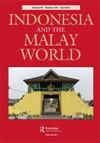印度尼西亚的Wetar和Kisar以及东帝汶
IF 0.9
3区 社会学
0 ASIAN STUDIES
引用次数: 3
摘要
本文研究了17世纪后期马鲁古西南部和东帝汶的一个鲜为人知的历史过程。这些都发生在早期殖民试图控制政治和经济的交叉点,以及当地适应或避免这种控制的战略。文章认为,欧洲或欧亚集团的抱负——荷兰VOC和葡萄牙多民族混居的Topasses——允许某些地方领导人利用早期的殖民竞争来建立超越他们传统特权的地位。此外,必须将这些过程视为全球、区域和地方空间层面之间的相互作用。这篇文章特别关注两位主人公。巴克是基萨尔岛的酋长,1668年在托帕斯入侵中被短暂驱逐,但被荷兰远征军复职,从此与荷兰在班达的哨所密切合作。西里·萨巴(拉贾·所罗门),是东帝汶阿德(Vemasse)的统治者。1668年,当托帕斯人在同一年入侵东帝汶时,试图与VOC结盟的尝试失败了,西里·萨巴被任命为VOC在Wetar的对话者。这篇文章展示了对文化相似的人群具有约束作用的韦塔尔海峡如何变成了一个仍然存在的海上边界。它还展示了当地群体如何通过抵抗和移民来阻碍强加的秩序。本文章由计算机程序翻译,如有差异,请以英文原文为准。
Wetar and Kisar in Indonesia, and East Timor
ABSTRACT The article studies a complex of little known historical processes in Southwestern Maluku and East Timor in the late 17th century. These occurred in the intersection between early colonial attempts at political and economic control, and local strategies to either accommodate or avoid such control. The article argues that the aspirations of European or Eurasian groups – the Dutch VOC and the ethnically mixed Portuguese Topasses – allowed certain local leaders to use early colonial rivalries to build up positions that transgressed their customary prerogatives. Moreover, the processes must be seen as an interplay between global, regional and local spatial levels. The article focuses in particular on two protagonists. Bakker, a chief in the island of Kisar, was briefly expelled through a Topass invasion in 1668 but reinstated by a Dutch expeditionary force, henceforth cooperating closely with the Dutch post in Banda. Sili Saba (Raja Salomon), was the ruler of Ade (Vemasse) in East Timor. An attempt to ally with the VOC in 1668 misfired as the Topasses invaded East Timor in the same year, and Sili Saba was installed as interlocutor for the VOC in Wetar. The article shows how the Wetar Straits, which had a binding function for culturally similar populations, was turned into a sea border which still persists. It also demonstrates how local groups obstructed the imposed order through resistance and migrations.
求助全文
通过发布文献求助,成功后即可免费获取论文全文。
去求助
来源期刊

Indonesia and the Malay World
ASIAN STUDIES-
CiteScore
2.00
自引率
0.00%
发文量
17
期刊介绍:
Indonesia and the Malay World is a peer-reviewed journal that is committed to the publication of scholarship in the arts and humanities on maritime Southeast Asia. It particularly focuses on the study of the languages, literatures, art, archaeology, history, religion, anthropology, performing arts, cinema and tourism of the region. In addition to welcoming individual articles, it also publishes special issues focusing on a particular theme or region. The journal is published three times a year, in March, July, and November.
 求助内容:
求助内容: 应助结果提醒方式:
应助结果提醒方式:


